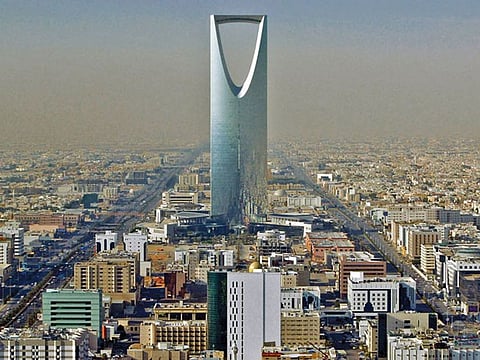Saudi Arabia salaries to be revised, projects delayed
Suspending cost of living allowance, raising VAT to mitigate economic impact of COVID-19

Dubai: Saudi Arabia announced a slew of austerity measures to cope with the impact of the coronavirus pandemic and an oil-price rout early morning on Monday.
The government also decided to raise value added tax (VAT) from 5 per cent to 15 per cent, starting from July 1, and suspend cost-of-living allowance, starting from June 1, according to state news agency SPA.
The steps taken to shore up revenue and rationalize spending are valued at about 100 billion riyals (Dh97.9 billion) in total, according to the official Saudi Press Agency.
Salaries revised
Among the biggest moves, the country's VAT will be increased to 15 per cent, from 5 per cent, starting July 1.
Saudi Finance Minister Mohammed al-Jadaan said the tax increase won't have much impact on revenue this year because people are spending less under the curfew, but it "will help more next year and the year after as we get out of the COVID-19 crisis."
Beginning in June, the government will also end a cost-of-living allowance paid to state workers. The 1000-riyal monthly allowance was granted in 2018. However, the allowance was supposed to be temporary, so the government decided to cancel it, al-Jadaan said, calling the effect "very limited".
"What we have seen from the announced measures are the ones that the team - both economists and other experts - thought would be the least damaging to the economy and the fiscal strength of the country," he said.
Al-Jadaan also announced that a committee was formed to study the salaries and benefits paid by a slew of new government entities that have been created outside the civil service umbrella, where employees are often paid significantly more than typical state workers. Such entities include the Vision 2030 programmes. The committee was told to give its recommendations within 30 days.
"This committee is going to look at the salary scales and the benefits of these new entities and bring about more rationalisation - and ensure that we don't have excess wages or unnecessary benefits that are distorting the labour market," he said.
Government aid to neediest Saudis will remain, al-Jadaan said. Shortly before the measures were announced, King Salman Bin Abdul Aziz ordered a payment of 1.85 billion riyals to be distributed to state welfare recipients to mark the occasion of Ramadan. The payments will include 1,000 riyals for each family and 500 riyals for each dependent.
Delayed Projects
Capital spending will also be impacted as the government delays or trims some projects. Part of that is due to the inevitable impact of coronavirus-related supply chain issues and safety measures, Al Jadaan said. He gave the example of a project to expand the holy mosque in Makkah - the epicentre of coronavirus cases in the kingdom - which the government "had to slow down significantly" to protect the health of construction workers.
Some of the kingdom's megaprojects, which include plans to build a tourism hub on the Red Sea and an "entertainment city" outside of Riyadh, will have their timelines extended.
"It may not be as fast as it used to be, but they are continuing," al-Jadaan said.
He further said: “We must reduce budget expenditures sharply, current actions taken to date to cut spending are not enough; Saudi public finances will need more control and the journey ahead is long."
Saudi Arabia's austerity measures are taken to support its coronavirus-hit economy.
In Saudi Arabia, the number of infections rose to 39,048 as of Sunday, of which 27,345 were active cases and 11,457 had recovered.
The Health Ministry reported seven new deaths on Sunday, all expatriates, raising the death toll to 246.







